
Related
President Obama accepted the Nobel Peace Prize today in Oslo, Norway, less than two weeks after he ordered 30,000 more troops to Afghanistan. In a possible attempt to avoid questions about the Afghan war, the White House has canceled the traditional press conference held by Nobel Peace Prize winners. In addition, the White House has canceled other events held every year, including a dinner with the Norwegian Nobel Committee, a television interview, appearances at a children’s event promoting peace, as well as a visit to an exhibition in his honor at the Nobel Peace Center. [includes rush transcript]
Transcript
AMY GOODMAN: This is Climate Countdown.
NNIMMO BASSEY: We are driven by three key words, and I would like you to repeat them after me. The first word is “mobilize.”
CROWD: Mobilize!
NNIMMO BASSEY: Number two is “resist.”
CROWD: Resist!
NNIMMO BASSEY: And to “transform.”
CROWD: Transform!
NNIMMO BASSEY: Resist, mobilize, transform!
ANNA KEENAN: I had my twenty-fourth birthday on day ten of the hunger strike. And now it’s day thirty-three of Climate Justice Fast, so I haven’t eaten in over a month.
ISABELLA MASINDE: We feel that the developed nations who are responsible for causing most of the global warming should support African countries so that they can adapt to the effects of climate change.
PROTESTERS: We are watching you! You know what to do! The number has been set! Pay the climate debt!
AMY GOODMAN: This is Democracy Now!, democracynow.org, The War and Peace Report. We are broadcasting live from Copenhagen from inside the Bella Center, where thousands of delegates from over 190 countries are gathering for the largest climate summit in history. Over the next two weeks, a hundred world leaders are expected to attend the UN conference that has been described by some scientists as the most important the world has ever seen.
We begin today, though, 300 miles away from here in Copenhagen, in the Norwegian capital of Oslo. That’s where President Barack Obama has received the Nobel Peace Prize, the award ceremony coming less than two weeks after President Obama ordered a major escalation of the war in Afghanistan.
In a possible attempt to avoid questions about the Afghan war, the White House has canceled the traditional press conference held for the Nobel Peace Prize winners. In addition, the White House has canceled other events held every year, including a dinner with the Norwegian Nobel Committee, a television interview, appearances at a children’s event promoting peace, as well as a visit to an exhibition in his honor at the Nobel Peace Center.
We’re going to go right now, live, to President Obama’s Nobel acceptance speech.
PRESIDENT BARACK OBAMA: …modernity, it perhaps comes as no surprise that people fear the loss of what they cherish in their particular identities — their race, their tribe and, perhaps most powerfully, their religion. In some places, this fear has led to conflict. At times, it even feels like we’re moving backwards. We see it in Middle East, as the conflict between Arabs and Jews seems to harden. We see it in nations that are torn asunder by tribal lines. And most dangerously, we see it in the way that religion is used to justify the murder of innocents by those who have distorted and defiled the great religion of Islam and who attacked my country from Afghanistan.
These extremists are not the first to kill in the name of God. The cruelties of the Crusades are amply recorded. But they remind us that no holy war can ever be a just war, for if you truly believe that you are carrying out divine will, then there is no need for restraint, no need to spare the pregnant mother or the medic or the Red Cross worker or even a person of one own’s faith. Such a warped view of religion is not just incompatible with the concept of peace, but I believe it’s incompatible with the very purpose of faith, for the one rule that lies at the heart of every major religion is that we do unto others as we would have them do unto us. Adhering to this law of love has always been the core struggle of human nature, for we are fallible. We make mistakes and fall victim to the temptations of pride and power, and sometimes evil. Even those of us with the best of intentions will at time fail to right the wrongs before us.
But we do not have to think that human nature is perfect for us to still believe that the human condition can be perfected. We do not have to live in an idealized world to still reach for those ideals that will make it a better place. The nonviolence practiced by men like Gandhi and King may not have been practical or possible in every circumstance, but the love that they preached, their fundamental faith in human progress, that must always be the North Star that guides us on our journey, for if we lose that faith, if we dismiss it as silly or naïve, if we divorce it from the decisions that we make on issues of war and peace, then we lose what’s best about humanity. We lose our sense of possibility. We lose our moral compass.
Like generations have before us, we must reject that future. As Dr. King said at this occasion so many years ago, “I refuse to accept despair as the final response to the ambiguities of history. I refuse to accept the idea that the 'isness' of man’s present nature makes him morally incapable of reaching up for the eternal 'oughtness' that forever confronts him.” Let us reach for the world that ought to be, that spark of the divine that still stirs within each of our souls.
Somewhere today, in the here and now, in the world as it is, a soldier sees he’s outgunned, but stands firm to keep the peace. Somewhere today, in this world, a young protestor awaits the brutality of her government, but has the courage to march on. Somewhere today, a mother facing punishing poverty still takes the time to teach her child, scrapes together what few coins she has to send that child to school, because she believes that a cruel world still has a place for that child’s dreams.
Let us live by their example. We can acknowledge that oppression will always be with us, and still strive for justice. We can admit the intractability of depravation and still strive for dignity. Clear-eyed, we can understand that there will be war, and still strive for peace. We can do that, for that is the story of human progress. That’s the hope of all the world. And at this moment of challenge, that must be our work here on earth.
Thank you very much.
AMY GOODMAN: The excerpt we have just played is the live excerpt of that speech as he was concluding. We’ll play more of the speech and also speak with a longtime South African activist about the significance of not only President Obama receiving the Nobel Peace Prize, but what’s happening 300 miles away, right here in Copenhagen, what some are calling the most important diplomatic meeting in history. This is Climate Countdown. Stay with us.
[break]
AMY GOODMAN: It is Climate Countdown. We’re broadcasting from Copenhagen. Meanwhile, 300 miles away, President Obama has just delivered his Nobel acceptance address. We’re going to go to an excerpt of that address earlier in his speech. President Obama in Oslo.
PRESIDENT BARACK OBAMA: I do not bring with me today a definitive solution to the problems of war. What I do know is that meeting these challenges will require the same vision, hard work and persistence of those men and women who acted so boldly decades ago. And it will require us to think in new ways about the notions of just war and the imperatives of a just peace.
We must begin by acknowledging a hard truth: we will not eradicate violent conflict in our lifetimes. There will be times when nations, acting individually or in concert, will find the use of force not only necessary, but morally justified.
I make this statement mindful of what Martin Luther King, Jr. said in this same ceremony years ago: “Violence never brings permanent peace. It solves no social problem: it merely creates new and more complicated ones.” As someone who stands here as a direct consequence of Dr. King’s life work, I am living testimony to the moral force of nonviolence. I know there is nothing weak, nothing passive, nothing naïve, in the creed and lives of Gandhi and King.
But as a head of state sworn to protect and defend my nation, I cannot be guided by their examples alone. I face the world as it is and cannot stand idle in the face of threats to the American people, for, make no mistake, evil does exist in the world. A nonviolent movement could not have halted Hitler’s armies. Negotiations cannot convince al-Qaeda’s leaders to lay down their arms. To say that force may sometimes be necessary is not a call to cynicism; it is a recognition of history, the imperfections of man and the limits of reason.
I raise this point, I begin with this point, because in many countries there is a deep ambivalence about military action today, no matter what the cause. And at times, this is joined by a reflexive suspicion of America, the world’s sole military superpower. Yet the world must remember that it was not simply international institutions, not just treaties and declarations, that brought stability to a post-World War II world.
Whatever mistakes we have made, the plain fact is this: the United States of America has helped underwrite global security for more than six decades with the blood of our citizens and the strength of our arms. The service and sacrifice of our men and women in uniform has promoted peace and prosperity from Germany to Korea and enabled democracy to take hold in places like the Balkans. We have borne this burden, not because we seek to impose our will. We have done so out of enlightened self-interest, because we seek a better future for our children and grandchildren, and we believe that their lives will be better if others’ children and grandchildren can live in freedom and prosperity.
So, yes, the instruments of war do have a role to play in preserving the peace. And yet, this truth must coexist with another: that no matter how justified, war promises human tragedy. The soldier’s courage and sacrifice is full of glory, expressing devotion to country, to cause, to comrades in arms. But war itself is never glorious, and we must never trumpet it as such.
So part of our challenge is reconciling these two seemingly irreconcilable truths, that war is sometimes necessary, and war, at some level, is an expression of human folly. Concretely, we must direct our effort to the task that President Kennedy called for long ago. “Let us focus,” he said, “on a more practical, more attainable peace, based not on a sudden revolution in human nature, but on a gradual evolution in human institutions.”
“A gradual evolution” of “human institutions.” What might this evolution look like? What might these practical steps be? To begin with, I believe that all nations, strong and weak alike, must adhere to standards that govern the use of force. I, like any head of state, reserve the right to act unilaterally, if necessary, to defend my nation. Nevertheless, I am convinced that adhering to standards, international standards, strengthens those who do and isolates and weakens those who don’t.
The world rallied around America after the 9/11 attacks and continues to support our efforts in Afghanistan because of the horror of those senseless attacks and the recognized principle of self-defense. Likewise, the world recognized the need to confront Saddam Hussein when he invaded Kuwait, a consensus that sent a clear message to all about the cost of aggression.
Furthermore, America — in fact, no nation can insist that others follow the rules of the road if we refuse to follow them ourselves, for when we don’t, our actions appear arbitrary and undercut the legitimacy of future interventions, no matter how justified. And this becomes particularly important when the purpose of military action extends beyond self-defense or the defense of one nation against an aggressor. More and more, we all confront difficult questions about how to prevent the slaughter of civilians by their own government or to stop a civil war whose violence and suffering can engulf an entire region.
I believe that force can be justified on humanitarian grounds, as it was in the Balkans or in other places that have been scarred by war. Inaction tears at our conscience and can lead to more costly intervention later. That’s why all responsible nations must embrace the role that militaries with a clear mandate can play to keep the peace.
America’s commitment to global security will never waver. But in a world in which threats are more diffuse, and missions more complex, America cannot act alone. America alone cannot secure the peace. This is true in Afghanistan. This is true in failed states like Somalia, where terrorism and piracy is joined by famine and human suffering. And sadly, it will continue to be true in unstable regions for years to come.
The leaders and soldiers of NATO countries, and other friends and allies, demonstrate this truth through the capacity and courage they’ve shown in Afghanistan. But in many countries, there is a disconnect between the efforts of those who serve and the ambivalence of the broader public. I understand why war is not popular. But I also know this: the belief that peace is desirable is rarely enough to achieve it.
Peace requires responsibility. Peace entails sacrifice. That’s why NATO continues to be indispensable. That’s why we must strengthen UN and regional peacekeeping and not leave the task to a few countries. That’s why we honor those who return home from peacekeeping and training abroad, to Oslo and Rome, to Ottawa and Sydney, to Dhaka and Kigali. We honor them not as makers of war, but as wagers of peace.
AMY GOODMAN: President Obama giving his Nobel acceptance speech in Oslo, Norway.

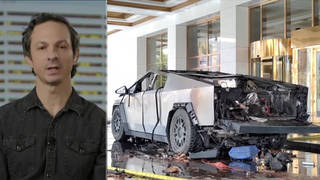
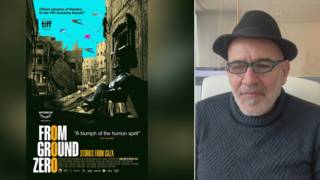
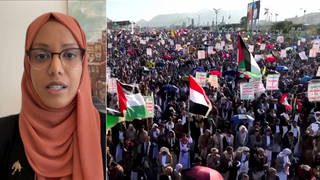
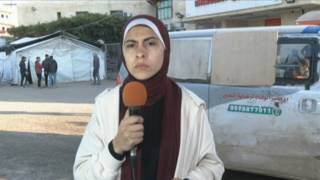






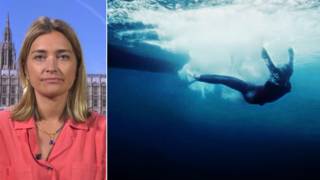
Media Options